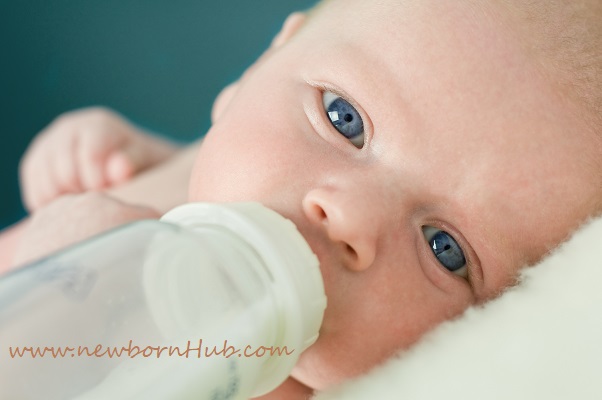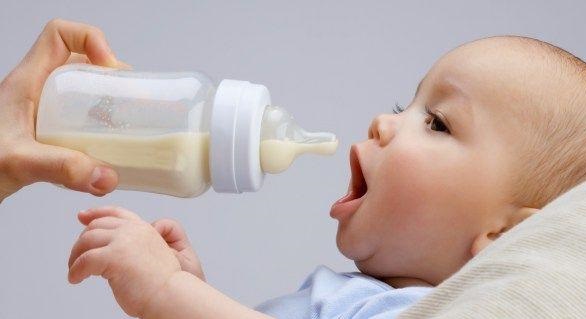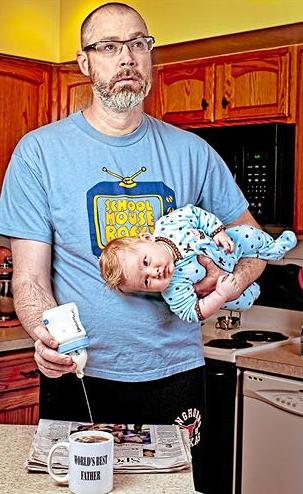- HOME
- Formula Feeding
Choosing to Bottle Feed
If you are choosing to bottle feed your baby, you have come to the right spot. Choosing the right baby formula is an important decision. The amount and frequency of formula milk intake of one baby may be different from the other. If you have decided to go with the bottle, you need to know the following basic guidelines for feeding your newborn baby.
In this section:
- How much formula milk does my newborn baby need?
- Feeding guide for baby formula in the first few weeks and months
- 6 - 12 months old formula feeding schedule
- How much formula to give to your 12 - 24 months old baby?
- Signs your baby is hungry
- Why is formula feeding bad?
- Good to know facts
- Mixing formula with breast milk
Choosing to Bottle Feed Your Newborn:
Newborn babies may seem very hungry (the general barometer is their crying on the top of their lungs) but keep in mind the fact that their bellies are quite small. Your newborn baby may not need a lot of infant formula to feel full.
Start giving your baby about 1 to 2 ounces of infant formula after every 2 to 3 hours. Do not wait for the baby to wake up and cry. If it’s 2-3 hours, prepare a bottle and gently push it in the baby’s mouth (you can start by letting your baby smell the milk and feel the bottle nipple touch the lips of your newborn baby). If you feel your baby is showing signs of hunger even after finishing up the bottle, give him/ her some more until the baby seems satisfied (he/she will fall asleep).
An average newborn baby may need to be formula fed around 8 to 12 times in a day. You can always consult your doctor or nurse to ask them if your baby is getting enough milk.
Once your newborn baby grows, so does his/her tummy. You will notice that as your newborn grows, the amount of formula milk increases at each feeding, however, the time between the feedings get longer.
Choosing to Bottle Feed in the First Few Weeks - 5 Months Old:
Unlike newborn babies than need to be fed once every two hours, as your baby grows, the gap between the feeding time increase to every 3 or 4 hours. You may have to wake your baby up after every 3 or 4 hours to ensure he/she is getting enough milk. In order to help your baby wake up, you can try doing one of the following:
- Pat or stroke him/ her gently.
- Undress the baby or change the baby’s clothes. This often wakes the babies up.
- Change the diaper. Many moms change the diaper after feeding the baby with the hope that the baby will soil the diaper after the feed. Studies suggest that changing the diaper before the feed (breast or formula) helps the baby in drinking the milk more comfortably, and generally without giving you a hard time.
When your baby is full, he/she will stop taking the feed. Sometimes the feeding session may be longer while at many times your baby will finish early. Do not force feed your baby if he/she seems done with his/her meal. If they are full, they are full. However, make sure that the baby is not drinking more milk because he/she is full, and not because the baby is too sleepy to drink.
Infant formula contains Vitamin D which is very important for your baby’s wellbeing. If your newborn baby drink around 32 ounces of formula milk, he/she may get the needed vitamin. However, if your newborn baby drinks less than 32 ounces in 24 hours, you may need to talk to the doctor and ask him about extra Vitamin D supplements which could be given to your baby right after birth.
6 to 12 Month Old Formula Feeding Schedule:
By the time your baby reaches the age of 6 months, you may want to introduce solids. Continue bottle feeding your baby until you feel your baby is not hungry anymore. Generally, your baby may require formula milk or some solid food about 5 to 6 times a day.
As your baby’s taste buds grow, you will notice that he/she will start relying on solids more and his/her demand for formula milk will decrease.
How Much Formula to Feed my 12 to 24 Months Old Baby?
As your baby becomes a toddler and reaches the milestone of his/her first birthday, you may want to start replacing the infant formula with fortified cow’s milk. Do it slowly. To help your baby with this transitions, replace one of the formula feeds with fortified cow’s milk. If your baby is okay with it, replace another feeding session with the cow’s milk until your baby is no longer on infant formula.
How to Tell if My Baby is Hungry?
Your baby will most likely show the following signs to tell you that he/she is hungry:
- The baby nuzzles against your breasts.
- Opens the mouth and starts moving the head in all directions (as if looking for the milk supply). This is known as rooting reflex.
- Starts sucking his/her hands, and even your hand or shirt.
- Makes lip smacking sounds and/or sucks his/her lips or tongue as if the baby is sucking for milk.
- Crying - which is usually the last response. The cry starts as a low-pitched one with fluctuating frequency. If the parent does not respond to the short episodes of crying, the baby will start crying very loud.
Why is Bottle Feeding Bad?
Why do we eat and drink all sorts of processed and junk food (not to mention this processed, unhealthy stuff gets converted into breastmilk that we proudly feed our baby), but the moment someone hears a mother opting for the bottle, we judge her in the most degrading, cruel way?
Now before some know-it-all milk-producing-mom lectures me on the heavenly advantages of breastfeeding, let me stop you right there - I've been there, done that. And I have fed my babies the formula as well. And guess what, breastfed or bottle-fed, when they grow up, all kids are unique and smart in their own special ways.
Formula Milk for Newborn - Tips
Keep in mind the following factors while going for formula milk for newborn babies:
- As your newborn baby grows older, the frequency of bottle feeding decreases whereas the amount of formula intake increases. When your baby starts taking solids, the number of formula feed also lessens. However, formula milk still remains your baby’s primary source of calories and important nutrients including proteins, vitamin D, and of course calcium.
- When breast milk is not an option and you need to go for formula milk, keep in mind that there are different brands selling their own versions of formula milk. It is better to ask your doctor or nurse about the best brand available in your country to make sure your baby gets the best nutrition possible.
- Unlike breast milk, formula milk should be given to your baby when the baby seems hungry. Keep an eye on your baby for signs of hunger as well as fullness to know when to feed your baby and how much you need to feed him/her. Your baby’s weight and growth along with the number of wet diapers per day will determine if your baby is getting the right amount of milk daily. Every baby has a different body structure and milk requirements, so talk to your baby’s doctor to see what the right amount of formula milk for your baby is. Though there are numerous charts available that help the parent in deciding the amount and frequency of formula according to your baby’s age, the doctor will provide you with a customized chart.
Mixing Formula with Breast Milk
Many mothers prefer a mix and match of formula milk for newborns with breast milk. While it is safe to feed your baby both types of milk, make sure you offer the milk separately. First let the breast milk (directly from the breast or pumped into a bottle) to finish off. Then if your baby is still hungry or the breast milk was not enough, make your baby a bottle. It is not advisable to mix formula and breastmilk in the same bottle.
You may need to go with both, here's why:
1. For a long night sleep:
Many moms breastfeed their baby during day time and at
night, before putting their newborn to sleep, they prepare a bottle for
him/ her. They do this because breast-milk is digested easily by the
tiny body, and finishing up a baby bottle before bedtime ensures a fuller tummy and a
relatively sounder sleep (for both the baby and hence the mommy). We just derived an equation here:
Happy tummy=happy mummy!
2. Working moms:
Many working moms however do the opposite. They expect the nanny or caregiver to go for formula milk for newborn (or older) babies when they are at work, and as soon as they get home, they may prefer to breastfeed. So to sum it up:
When the mummy is away,
the bottles come in to play!
3. Back-to-back babies:
If you are currently breastfeeding and found out that you are pregnant with another baby, chances are that your gynecologist will ask you to stop breastfeeding and choose to bottle feed instead. The baby in the tummy will require a lot of nutrients that the mother needs to save and provide. So if you are going to have back-to-back newborns, make sure you have a set of baby formula bottles to back it up.
4. Choosing to Bottle Feed during Fasting:
Doing Keto and/or going for intermittent fasting? Formula milk can provide nutrition to your baby without further draining you. Also, considering
some women's religious approach, many Muslim women tend to switch to the bottle (due to decreased energy level) during the one month Fasting ritual of Ramadan. This is however purely optional and many women still continue to breastfeed during their fasts.
When going for formula milk for newborn babies, don't forget to sterilize the bottles. This is one thing breastfeeding mothers would never have to worry about, unless they express their breast milk using breastfeeding pump.
5. So the dads don't feel left out:
It is a great way for dads to connect with their babies if you choose to bottle feed. Many dads feel left out during the whole process of birth and breastfeeding, but the good news is that they can have their share of fatherhood by spending some real quality time with their newborns thanks to baby formula.
Conclusion: Choosing to bottle feed
What is so bad about choosing to bottle feed your baby? The answer is simple:
Absolutely nothing. It's a bottle full of goodness for moms who really need it.
See also:
- Formula Feeding 101
- Advantages of formula feeding
- Disadvantages of formula feeding
- How to clean feeding bottles?
- Tap, boiled or bottled water for formula feeding?
- Baby vomiting after feeding formula
- The Do's & Don'ts of Formula Feeding
- The ONLY Bottle feeding accessories you should buy.
Have a question about Formula Feeding?
Post a question related to Bottle-feeding here and get answers by our expert moms! You can also leave some advice or share your story for formula feeding moms.
Return from Choosing to Bottle Feed to Homepage.






New! Comments
Have something to say about what you just read? Leave me a comment in the box below :)